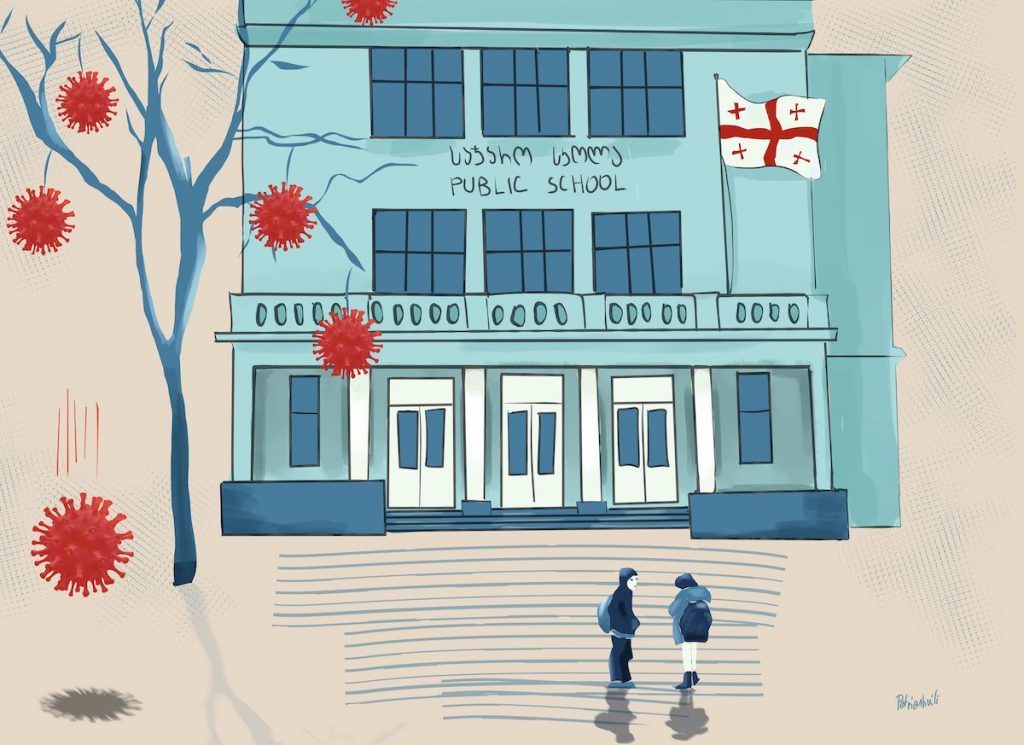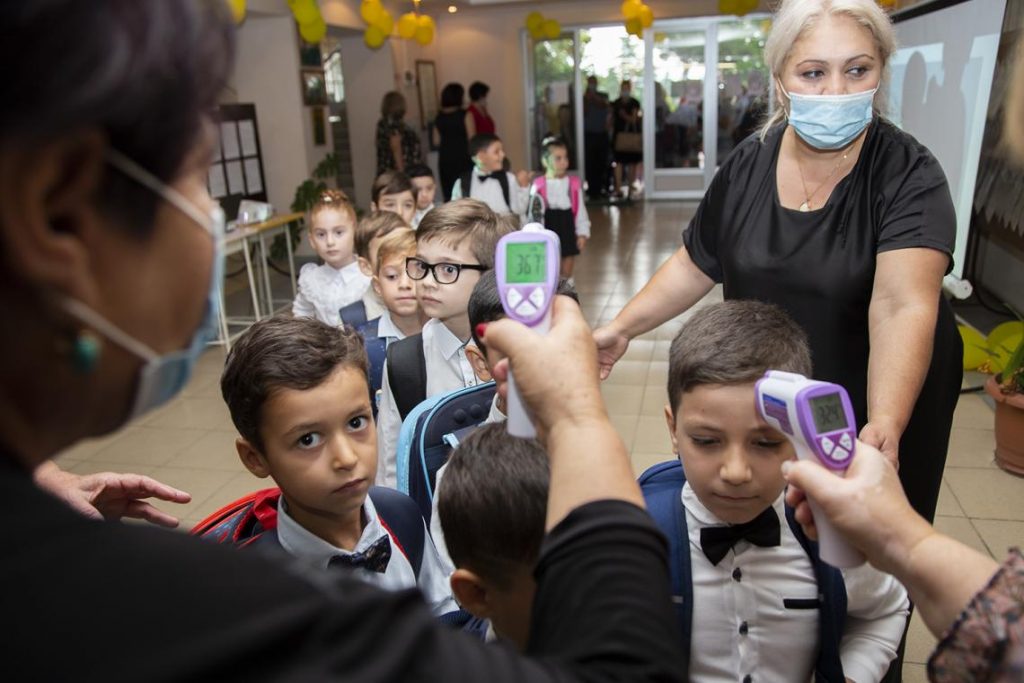Are Georgian schools ready to reopen on February 15?

All public schools will open in Georgia on February 15 after almost a year-long break.
Parents, child psychologists and human rights activists have long called for the opening of schools, including at protests. However, when the decision was made to go ahead and open schools, it was met with more questions than expressions of relief.
Under what conditions are schools being opened? Does the government have a specific plan and are schools ready to accept children?
For almost a year now, Public School No. 192 has had locked classrooms, empty dining rooms and corridors.
There is no one at the school except the security guard, who learned from us that the school will reopen on February 15 and, at our request, contacted the school principal by phone; principal Nato Gochaleishvili told us that she heard about the opening of the school on television.
School’s out: Georgian children on studying from home. Photo story
“I don’t see this as a problem. There are more than two thousand schools in Georgia, and their staff cannot contact everyone physically,” the school director told us, adding that at the time of our conversation, representatives of the Ministry of Education had not contacted her, and the school had not received any instructions.
Georgian Prime Minister Giorgi Gakharia announced the opening of schools on February 4.
Later that day, puzzled school principals appeared on the news and were “surprised” by the news.
The main problem for the government is the spontaneity of important decisions and the lack of a concrete plan, says education expert Revaz Apkhazava:
“Both the closure of the schools and their reopening was a spontaneous and thoughtless decision. Not guided by any plan, they gathered in a closed meeting and made a decision. They didn’t even inform the employees of the Ministry of Education”.
Incomprehensible rules
It has been several days since the prime minister announced the opening of schools, but it is still unclear what specific rules schools should follow.
The fact that the decision to open was taken without any preliminary preparation is also evidenced by the fact that the prime minister’s statement did not comply with the specific directives of the Ministry of Education, which should guide schools.
For example, the ministry initially stated that students were not required to wear masks, but a few days later they announced that masks are required for students from the fifth grade and above.
The ministry released its first statement only after criticism was voiced on Facebook and TV channels. In confusion, parents and teachers asked each other on what conditions the schools would open. However, there was nothing concrete in this statement and it raised even more questions.

For example, the statement reads: “Toilets in about 800 schools have been completely renovated for the new school year.” There are more than two thousand schools in Georgia, and does this mean that the toilets in other schools are not in order?
Later, another statement was published on the agency’s website – the recommendations of the Ministry of Health. This document instructs schools to develop a plan for the provision of disinfectants, student flow control, toilet facilities, etc.
The word “out of necessity” appears most often here. For example, the school must decide for itself whether to shift instruction if necessary.
Experts say that the Ministry of Education handed over to schools a document developed by the Ministry of Health and placed all responsibility on schools.
Lawsuit against the Ministry of Education
“The education ministry’s statements are a sign that the system is not ready to open schools and is effectively putting children and teachers at risk,” says lawyer and children’s rights activist Anna Arganashvili.
The non-governmental organization Partnership for Human Rights, represented by Arganashvili, even filed a lawsuit against the Education Ministry in the Tbilisi City Court.
In the lawsuit, the organization demands from the department a specific plan for opening schools.
Arganashvili says that instead of the announcements posted on the ministry’s website and Facebook posts, the ministry should issue recommendations in the form of a regulation or order:
“The Ministry of Education writes that it will send recommendations to parents of students in the form of messages and e-mail. Education in the country cannot be controlled by SMS. First, we need to adopt regulations, plans and resolutions, and then talk about messages,” said Arganashvili.
Disinfectants and other sanitary measures are included in the school’s recommendations, she said, but it’s unclear how much they should buy all of this:
“We are not being told that schools simply do not have the means to fight the pandemic. What could be worse? That is, no one is going to increase the budget of schools, but it is necessary,” says Anna Arganashvili.
Expert Revaz Apkhazava also says the education system left schools unprepared in the face of the pandemic:
“Now they remembered about decentralization. Schools are not granted independence if necessary. And now, when the school needs support the most, the full responsibility for fighting the virus is being placed on school teachers. ”
According to Apkhazava, judging by the statements made today, it is completely unclear which department will be responsible for possible outbreaks of the epidemic in schools – the Ministry of Education or the Ministry of Health.
Kutaisi is one of the cities where the educational process will resume on Monday.
JAMnews spoke with the director of a public school in Kutaisi, who wished to remain anonymous.
“We were told that we have to organize shifts so that not all children go to school at the same time, but we do not know how to do this. How many children should there be in the class? All this is new to us. Did someone meet with us and explain? The guidelines say that those who fall behind in the learning process should be given one-to-one lessons. And even separate online lessons for children who remain distance learning. And do we have the resources for this? How to teach lessons at school and zoom at the same time? All this is incomprehensible, ”he said.
What epidemiologists say
The system is not ready to launch the educational process in a pandemic, said epidemiologist Maya Butsashvili. However, in her opinion, it is wrong to insist on continuing distance learning.
According to her, parents should not demand to keep schools closed, but to open them in compliance with the rules:
“One year is a very long time to resolve this issue (exactly one year has passed since the schools were actually closed),” Butsashvili wrote on Facebook.
Butsashvili says that some of the rules to be adopted are reflected in the document of the ministries of education and health, but the problem is that this document is in the form of general recommendations. And there is no guarantee that school principals will follow the rules.
Parental dilemma
If at first parents enthusiastically wrote on Facebook that the children will finally return to classes, now their posts have become much more cautious.
Opening schools with no plans or strict commitments presents parents with a dilemma (including those who protested and demanded school reopening) – should their children be allowed to go to school at all, or left to distance learning?
Teona Nanuashvili, the mother of six-year-old Irinka and 12-year-old Nikusha, was among those who saw long-term school closures as a mistake. However, today she does not know how to behave, whether to send her children to school:
“I am very confused. I call our class teacher, and she does not have answers even to the simplest questions. How many children will be in the class, how will they keep their distance, will there be any changes? They don’t know anything yet. At first they said masks would not be needed, but now it turns out that the rules have changed. “
Unlike public schools, private schools do better logistics. Anyway, there are more specific answers to parents’ questions.
Irina’s eight-year-old son is studying in one of the private schools.
“We have a Facebook page and we receive detailed information about the conditions under which the school will be opened. For example, we already know that parents are not allowed to enter the school grounds, wearing a mask is mandatory. Children sit in a checkerboard pattern, not next to them. They will not use the dining room and will eat in their place. The windows will be mostly open, and as soon as the weather permits, some lessons will be held outdoors. But they did not say anything about the division of classes, there are 15 children in one class, “said Irina.
Unequal conditions
Revaz Apkhazava says inequality in the education system between public and private schools is another big problem that existed before, and the pandemic has made it even stronger:
“Due to the weakness of the education system, we got a class state in which children have no equal opportunities to receive education. Children of ethnic minorities and those living in villages are especially vulnerable. Apart from the infrastructural problems that need to be addressed, do we even know how many children were left without access to education?
All over the world, losses in education are spoken of and measured. And we are resuming their studies as if these children were on a week’s vacation. What are our losses? How many children are left without online education? Are they even registered? Or what is our plan for getting them back to school? This is a tragedy. We may never return these children to the educational process, ”Revaz Abkhazava says.
World experience
According to UNESCO’s interactive monitoring map, countries are divided into two categories: countries where schools have been closed for an average of 21-30 weeks since the start of the pandemic, and countries where school has been suspended for 31-40 weeks.
The first category includes mainly European countries and other developed countries. Georgia also fell into this category, but a few days ago it moved to the countries of the “high” category, where along with Georgia – Libya, Iran, Uganda, Kenya, Ethiopia, etc.
At the beginning of the epidemic, in March last year, 46 countries around the world stopped the educational process in schools due to the coronavirus.
Among them was Georgia, where studies were suspended in March and opened only for a couple of weeks in September.
According to the latest data, 60 percent of schools in 186 countries were closed during the pandemic, leaving 1.5 billion students at home.
The civilized world is already concerned that more than 800 million students (more than half of the world’s total) face difficulties in the educational process, overcoming which could remain a future challenge for humanity.
Against this background, experts are constantly warned that closing schools should be a last resort, and their safe reopening a priority.
UNESCO Director-General Audrey Azoulay has repeatedly stated this and urged countries to focus on school education.


















